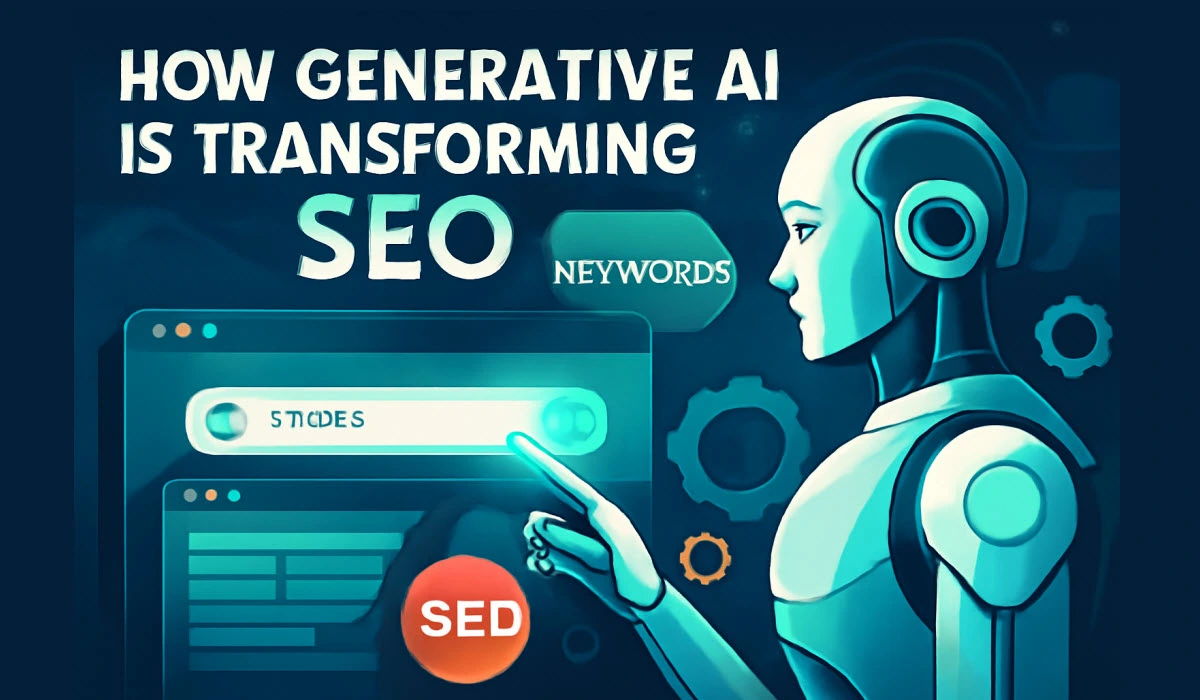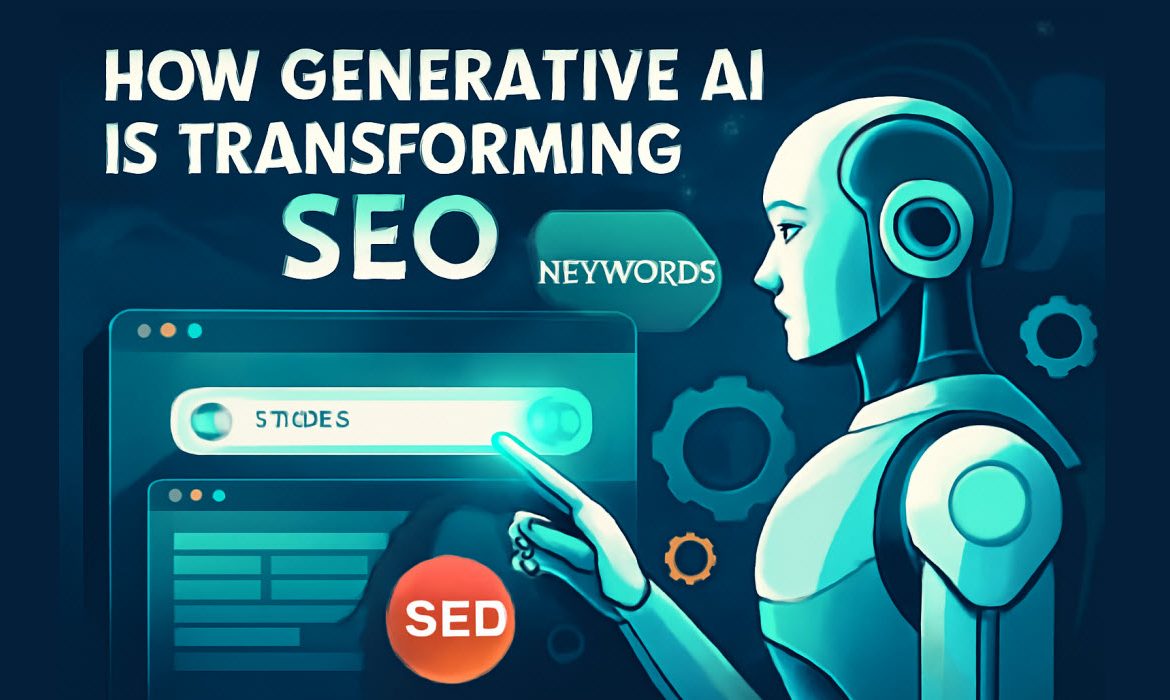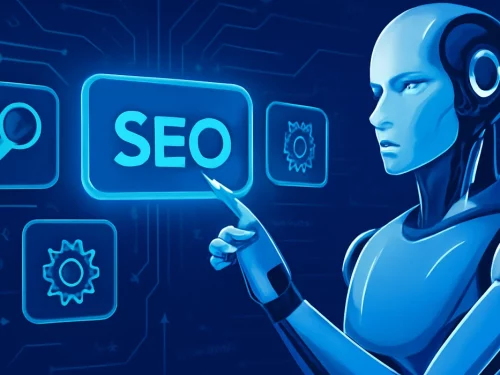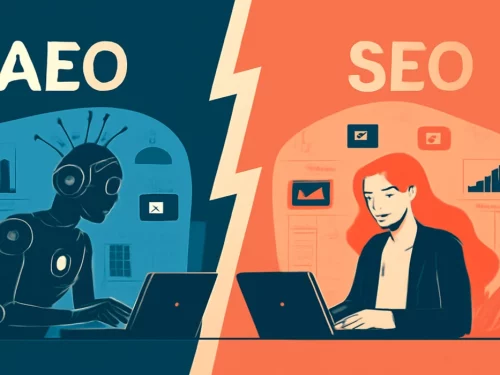
In the world of digital marketing, change is the only constant. If you’ve been in the SEO game for any length of time, you know that what worked yesterday might not work today. With the rise of Generative Search, the traditional methods of search engine optimization (SEO) that we’ve relied on for years are being tested. But does this mean traditional SEO is dead?
In this blog, we will explore the rise of Generative Search and how it is shifting the way search engines work, altering SEO practices, and what businesses need to know to stay ahead of the curve. Let’s dive into how AI-driven search technology is challenging the status quo of traditional SEO and what that means for you.
Traditional SEO: A Brief Recap
To understand the shift toward generative search, it’s important to first understand the basics of traditional SEO. For years, SEO was about targeting specific keywords, earning backlinks, and optimizing on-page elements like headings, titles, and meta descriptions.
Traditional SEO Components Include:
- Keyword Research and Optimization: Identifying search terms that users are likely to enter and incorporating them into your content.
- Backlink Building: Acquiring backlinks from high-authority sites to increase domain authority and improve rankings.
- Technical SEO: Optimizing site speed, mobile-friendliness, and crawlability to ensure that search engines can easily index your website.
- Content Creation: Crafting blog posts, landing pages, and product descriptions that target specific keywords to rank higher.
For example, when Google first started ranking web pages, it mainly focused on keyword frequency and relevance. A website with a high number of quality backlinks would rank higher than others.
However, with the rapid advancement of Generative Search technology, SEO is evolving. Let’s explore this new approach.
What Is Generative Search?
Generative Search leverages Artificial Intelligence and Natural Language Processing (NLP) to better understand user intent and deliver more sophisticated search results. Unlike traditional search engines, which match queries to exact keywords and rankings, generative search engines like Google’s BERT and OpenAI’s GPT are able to interpret the context of a query and generate relevant, useful content that answers a searcher’s questions directly.
Real-Life Example:
- Traditional SEO would rely on exact keyword searches like “SEO tips for beginners.” However, generative search can look at this query contextually, offering an answer like “The best beginner SEO strategies for website success,” providing a more comprehensive, valuable response, and even suggesting steps to get started.
In short, generative search isn’t just about keywords anymore—it’s about understanding the deeper intent behind the query and delivering relevant, high-quality answers.
How Generative Search Is Changing SEO Rules
The advent of generative search is significantly impacting traditional SEO methods. Here are some key changes:
A. Shift from Keywords to User Intent
- Traditional SEO emphasized exact match keywords. Now, generative search focuses on understanding intent behind queries.
- Fact: According to Google, over 70% of searches are now based on long-tail keywords or conversational phrases, showing a growing trend toward intent-based search rather than exact keyword matches.
- Real-Life Example: A search like “How to optimize content for SEO?” may now yield an AI-generated response that summarizes best practices, tools, and provides a content creation blueprint.
B. More Natural Language Processing (NLP)
- Search engines are increasingly using NLP to better understand how people speak and ask questions.
- Fact: In 2020, Google launched BERT (Bidirectional Encoder Representations from Transformers), an AI algorithm designed to better understand natural language. This has allowed search engines to give more contextually relevant search results, making exact keyword matches less of a focus.
- Real-Life Example: A user might ask a question like, “What is the best way to cook pasta for beginners?” With generative search, the engine will understand this query as a request for a beginner’s guide and offer content, like step-by-step instructions, ingredients, and tips—all in a conversational tone.
C. Impact on Content Strategy
- Generative Search is changing how marketers approach content creation. Instead of focusing solely on keyword density, the emphasis is now on creating comprehensive, high-quality content that answers users’ questions fully.
- Real-Life Example: A well-optimized page about “How to Build an SEO Strategy” will no longer just include a list of keywords. It will provide actionable steps, real-world examples, and even generate contextual tips using AI-based insights.
Is Traditional SEO Dead?
While generative search is rapidly gaining ground, it would be premature to say traditional SEO is dead. Instead, traditional SEO is evolving, and businesses must adapt their strategies.
Key Takeaways:
- Traditional SEO: Keyword optimization, link-building, and technical SEO still play an important role.
- Generative Search: The focus is now on user intent and providing valuable, context-driven content.
- Hybrid Approach: Marketers should blend traditional SEO with generative search strategies to stay ahead. Traditional SEO techniques will continue to be effective, but incorporating AI-powered tools and focusing on content that answers user intent will yield greater success.
What This Means for Digital Marketers
For businesses and digital marketers looking to thrive in this new SEO landscape, here are a few actionable steps to follow:
- Embrace AI and NLP: Tools like ChatGPT, Google’s BERT, and other AI-powered content creators will help marketers stay ahead. Tools that analyze search intent and generate high-quality content should become part of your SEO toolkit.
- Create Contextual, Intent-Driven Content: Rather than optimizing for specific keywords, focus on answering questions and providing value. Use natural language, and ensure your content is structured to fulfill a variety of search intents.
- Stay Up-to-Date on SEO Changes: With new AI algorithms coming into play, it’s crucial to stay informed on how Google and other search engines are evolving their systems.
How Evendigit Can Help Your Business Adapt
At Evendigit, we specialize in helping businesses stay ahead of SEO trends by combining traditional SEO techniques with the latest advancements in Generative Search. Our expert team uses AI-driven tools to analyze user intent, generate high-quality content, and optimize websites for maximum visibility in today’s competitive digital landscape.
How We Can Help:
- AI-Powered SEO Audits: We use AI tools to analyze your website and generate actionable insights that ensure your content is aligned with modern SEO practices.
- Content Strategy and Creation: We help you develop comprehensive content strategies that focus on solving user problems, providing in-depth answers, and improving user experience.
- Ongoing Optimization: As search engines continue to evolve, we stay on top of algorithm updates, ensuring that your SEO strategy adapts accordingly.
Fact: According to a study by BrightEdge, businesses that integrate AI into their marketing strategies see a 40% increase in ROI and a 50% reduction in content creation time. This demonstrates the power of combining traditional SEO with emerging generative search technologies.
If you’re looking to learn more, explore our comprehensive guide on What Does SEO Mean?, or get insights on how AI-driven SEO can specifically help your small business succeed with our post on Smarter SEO for Small Business with AI Search. Additionally, you can check out our Professional SEO Services that can help you adapt to the future of SEO.
Example of a Brand That Flourished with Generative Search and SEO
A great example of a brand that successfully integrated Generative Search and traditional SEO is Sephora, the global cosmetics retailer. By embracing AI-driven search and content strategies, Sephora significantly enhanced its customer experience.
- SEO + Generative Search Strategy: Sephora started optimizing for more intent-based queries such as “best skincare for oily skin” or “how to apply foundation.” Using AI-generated recommendations, product descriptions, and a better understanding of user preferences, they provided more contextual and personalized responses.
- Result: As a result, Sephora saw an increase in engagement on their website and app, with a 30% increase in organic traffic. Their conversion rate also improved as customers found more relevant content tailored to their specific needs, driving sales and increasing brand loyalty.
Conclusion
Traditional SEO isn’t dead, but it’s certainly evolving. The rise of Generative Search is changing the way search engines understand user intent and deliver content. By adopting a hybrid SEO approach, combining proven traditional strategies with AI-powered generative search techniques, businesses can maintain their competitive edge and continue driving relevant traffic to their websites.
If you’re ready to adapt your SEO strategy to the changing landscape, Evendigit is here to help. Contact us today for a consultation and take the first step toward future-proofing your digital marketing efforts.
Let us know your thoughts on generative search and SEO! Have you noticed changes in your rankings or user engagement? Leave a comment below or reach out to Evendigit for more information on how we can help you optimize your site for the future of SEO.
Some Frequently Asked Questions
1. Is traditional SEO dead?
No, traditional SEO is not dead. While Generative AI (GenAI) and newer search technologies are changing how we approach SEO, traditional SEO practices such as keyword optimization, backlink building, and technical SEO are still crucial. What has changed is that SEO now requires a hybrid approach, integrating AI-driven insights and a deeper focus on user intent. By combining these with traditional methods, businesses can still achieve strong results.
2. How does GenAI affect SEO?
Generative AI (GenAI) is reshaping the landscape of SEO by emphasizing contextual understanding and user intent over exact keyword matches. With tools like Google’s BERT and OpenAI’s GPT, search engines can interpret natural language more effectively. This means content creators need to focus on providing valuable, comprehensive answers to users’ questions instead of just optimizing for specific keywords. AI is enhancing SEO by helping businesses craft content that aligns better with user needs, driving more relevant traffic and improving user experience.
3. Is SEO dead because of AI?
No, SEO is not dead because of AI. In fact, AI is enhancing SEO by making it more intelligent and user-focused. While AI-powered search engines are changing the way results are generated, SEO is evolving rather than becoming obsolete. SEO practices are being adapted to take advantage of AI, helping businesses create content that aligns with user intent and improves search engine rankings. By combining AI with traditional SEO techniques, businesses can optimize their websites more effectively, ensuring that they stay competitive in the digital space.
EvenDigit
EvenDigit is an award-winning Digital Marketing agency, a brand owned by Softude (formerly Systematix Infotech) – A CMMI Level 5 Company. Softude creates leading-edge digital transformation solutions to help domain-leading businesses and innovative startups deliver to excel.
We are a team of 70+ enthusiastic millennials who are experienced, result-driven, and hard-wired digital marketers, and that collectively makes us EvenDigit. Read More




